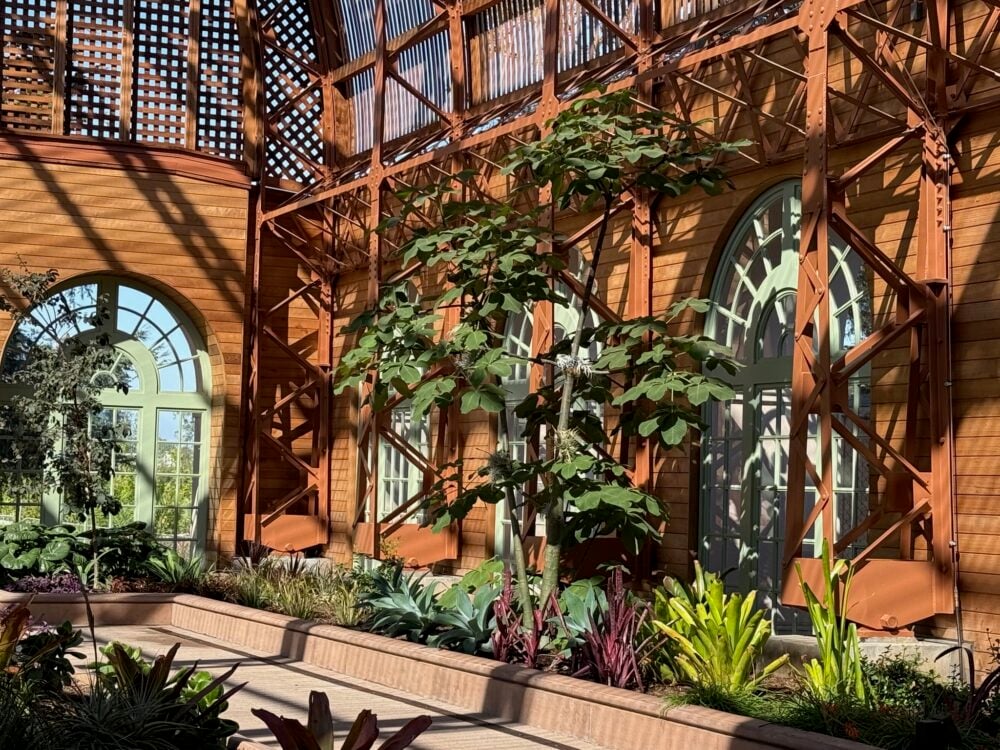

Contributor
- Topics: Archive

An amazing number of the world’s nocturnal and night-fragrant plants are pollinated by bats, or their eventual seeds are spread about by bats that are attracted to their tempting fruits. Although a number of cactuses are bat-pollinated, including the great saguaro cactus of the American Southwest, the majority of these plants are tropical.
Bat flowers are characterized by blooming mostly at night, and, like moth-pollinated flowers, predominantly have a white or cream color. These flowers have a strong odor at night, often reminiscent of fermentation. They also bear a large quantity of nectar and pollen. Finally, bat flowers are often positioned away from the plant’s foliage since flower-pollinating bats have a less developed sonar system than most of the other bat varieties.
There are approximately two hundred species of Heliconia, tropical plants related to the banana and best known in the flower trade as lobster-claws or false birds-of-paradise. Most of these flowers are pollinated by hummingbirds, but one, H. solomonensis, has a relatively inconspicuous green inflorescense and flowers, and bright orange fruits, and is bat-pollinated.
Among the plants pollinated by bats are bananas, the sausage trees (Kigelia spp.), various members of the genus Bombax, and the durian tree (Durio zibethinus) of Southeast Asia.
Elizabeth Erdman is an American conservationist and a champion of the bat. She is out to tell the world what many people know but many more do not: that the bat is a valuable predator, harmless to people, having a relatively low incidence of rabies—more people are killed by lightning strikes or bee stings than bat rabies. In thirty years, only ten people in the United States and Canada have contracted rabies from bats. Like everything else, there is reason for keeping the public afraid of bats: the lucrative pest control industry.
“Bats are nature’s way of keeping our insect population in check,” says Erdman. “They are the only major predator of night-flying insects in the world. Incredible as it may seem, some bats consume half their body weight in insects in one night, and they may consume half of that, or one-quarter of their body weight, in as little time as thirty minutes. Bats have been known to travel up to fifty miles in one night to get their fill, returning home to roost during the day.”
Erdman and Bat Conservation International (BCI) warn everyone that the bat is in danger, and her facts are backed up by the United States Department of Interior. According to their publications, bats are being killed by people, insecticides, and habitat destruction at an alarming rate.
“People are needlessly afraid of bats,” she said. “This is primarily due to the legend of Dracula and the rumors of bats attacking people. But bats are really gentle, warm-blooded mammals that keep to themselves and are an integral part of our ecological system and vital to natural insect control.”
My wife and I both believe her. So in our old garden we installed a bat box fifteen feet above the ground in the white pine tree that stood between the garden’s edge and the nearby woods. We used plans from BCI to build the bat home, and it was occupied by the first bat family by mid-May.
Adapted from The Evening Garden: Flowers and Fragrance From Dusk Till Dawn, by Peter Loewer, republished by Timber Press in 2002.








Responses